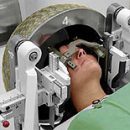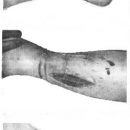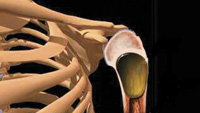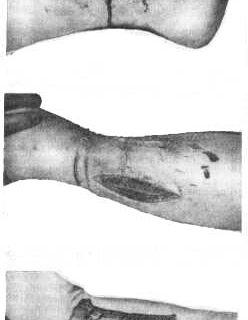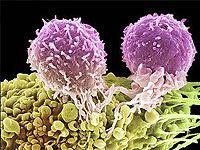The exact cause of kidney cancer is unknown, however, some risk factors associated with this disease are known.
Content
Causes of kidney cancer
Smoking Doubts the risk of developing kidney cancer.
Asbestos. Some believe that there is a relationship between contact with asbestos and kidney cancer.
Cadmium. The relationship between the effects of cadmium and kidney cancer. In addition, cadmium can enhance the carcinogenic effect of smoking. Contact with cadmium in the air can be in the production of electric batteries, paints and materials for welding.
Mutations (changes) genes can lead to an increase in the risk of developing kidney cancer. Some mutations can be inherited (in people with family cases of kidney cancer), others arise in subsequent, for example, under the influence of smoking.
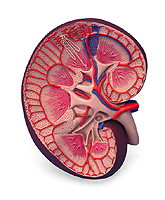 Syndrome Von Hippel-Lindau caused by inherited mutation of the gene and can increase the likelihood of kidney cancer.
Syndrome Von Hippel-Lindau caused by inherited mutation of the gene and can increase the likelihood of kidney cancer.
Tuberous sclerosis. Patients with this disease often have cysts in the kidneys, liver and pancreas, and also increased the likelihood of kidney cancer.
Diet and weight. Eating with a high fat content leading to obesity is accompanied by an increase in the risk of kidney cancer.
Long-term dialysis.In patients with long-term dialysis, the appearance of a cyst in the kidneys, which can contribute to the development of cancer of this authority.
Age. The kidnotee cancer is rarely found in children and young adults and is most often diagnosed in people aged 50-70 years.
Floor. In men, the probability of developing kidney cancer is twice as high as women.
To prevent the occurrence of kidney cancer is impossible, however, taking into account the connection of smoking with this type of cancer, it is recommended to get rid of this habit. If you work with asbestos and cadmium, follow safety instructions.
How the kidney cancer is detected?
Most patients with kidney cancer are found when some signs or symptoms appear. Screening (tumor detection without symptoms) Kidney cancer does not exist, so at the moment of diagnosis, the tumor is usually large. But sometimes kidney cancer is found randomly during a survey about any other reason. In the early detection of tumor, the survival of patients is high.
The presence of blood in the urine is the most frequent sign of kidney cancer. However, blood in the urine can be in the infection of the bladder and other non-tuch diseases.
Symptoms of kidney cancer:
- The presence of blood in the urine
- Backache
- Tumor in stomach
- Tired
- Fast rapid slimming
- Increased temperature in the absence of cold, influenza, etc. infections
- Swelling of joints and lower extremities
- High blood pressure
These signs and symptoms may be associated with other diseases.
Diagnostics of kidney cancer
When suspected the kidney tumor, it is necessary to conduct a survey.
Computed tomography (CT) Due to multiple X-rays, it allows you to get a detailed picture of internal organs, including kidneys.
Magnetic resonance Tomography (MRI) lies in the use of large magnets and radio waves and makes it possible to study in detail the kidneys and other organs.
Ultrasound Research (Ultrasound) Allows with sound waves to consider the condition of the abdominal organs and the retroperitoneal space.
Intravenous pyelogram. Introduction of a special contrast agent to Vienna can help reveal the kidney tumor and its degree.
Arteriography. In this method, a special contrast agent introduced into the artery associated with the kidney. In this way, vessels that feed the tumor are detected, which helps the surgeon to plan an operation.
X-ray examination of the chest makes it possible to detect metastases in the lungs and damage to the bones of this area.
Bone scanning allows you to diagnose their defeat.
Laboratory research:
- In the urine analysis, you can detect bacteria and sometimes tumor cells
- In the analysis of peripheral blood, you can reveal anemia (anemia)
Cystoscopy. In this method, the device in the form of a long thin tube is introduced into the bladder. This makes it possible to detect the urethra tumor.
Treatment of kidney cancer
The operation is the main method of the treatment of kidney cancer. The most frequently performed radical nephrectomy at which the entire kidney, adrenal gland and surrounding fatty fabric are removed, as well as nearby lymph nodes.
With small cancer sizes, partial removal of the kidney (resection) can be produced along with a tumor. Such an operation can also be carried out in bilateral kidney damage or with only one kidney. Sometimes the kidney with a tumor is removed to invest pain, although this operation usually does not prolong the life of the patient.
Artery embolization is to stop the blood current to the kidney. This type of intervention is sometimes used to the operation to destroy part of tumor cells and reduce bleeding during the removal of the kidney, as well as in some inoperable patients.
If the overall condition of the patient does not allow for surgery, it is possible to carry out another type of treatment.
In a number of patients, chemotherapy can be carried out in addition to the operation. However, as a rule, kidney cancer is little sensitive to antitumor drugs.
Radiation therapy can be recommended for patients who will not postpone the operation. Exposure helps reduce pain and bleeding associated with kidney cancer.
Immunotherapy is aimed at strengthening the struggle of the immune system with a tumor. There are several immunotherapy methods, one of which is the use of Interferon.

